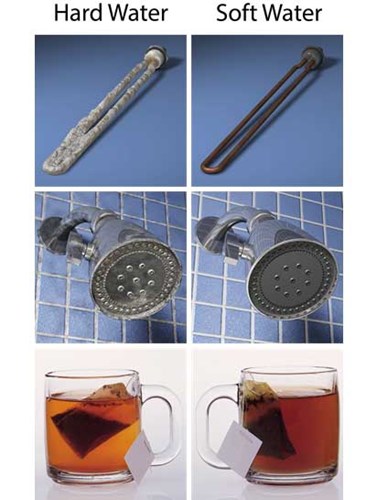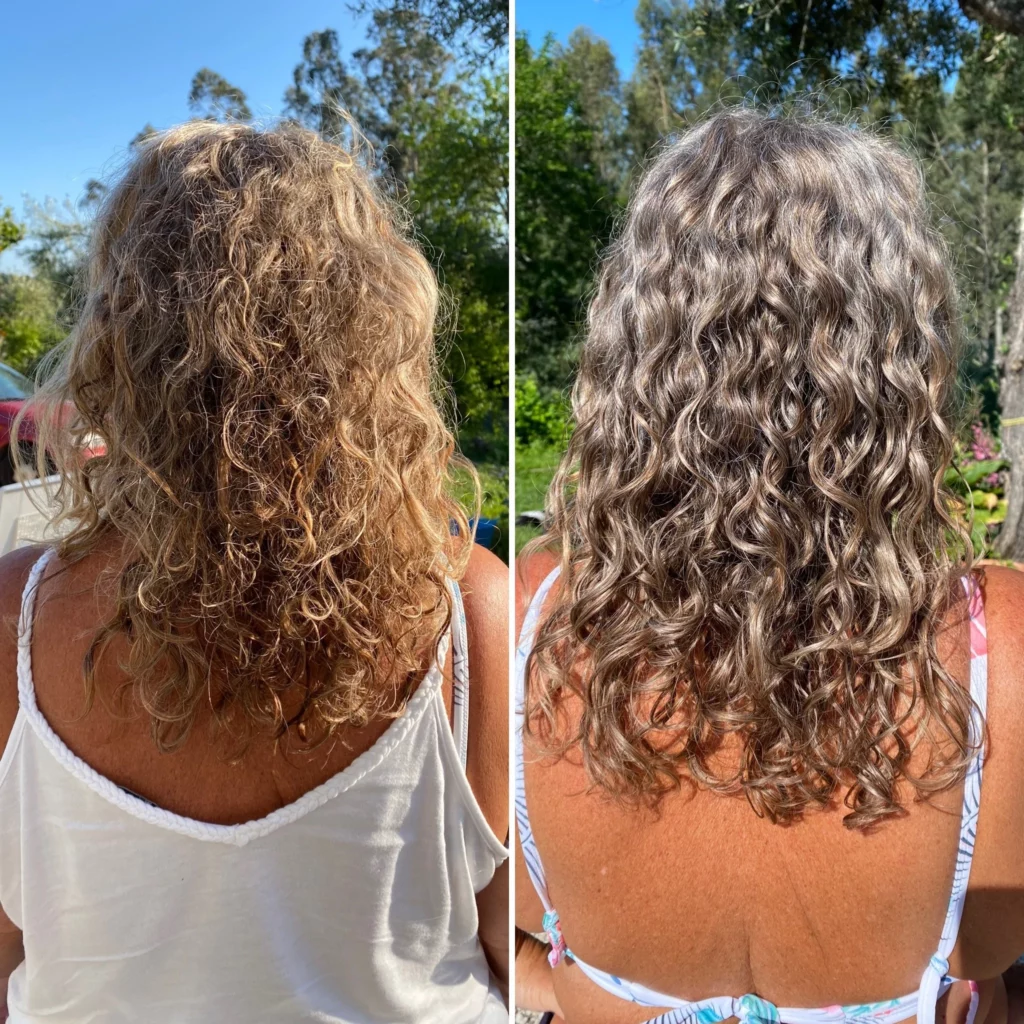Introduction
Hard water minerals are to blame if you’ve ever noticed a film on your hands after you’ve washed them.
Consider what it is doing to your hair right now. The result of hard water on hair? Damage. Damage happens because minerals like calcium and magnesium accumulate in hard water. As a result, the hair develops a layer that prevents moisture from penetrating. The hair is left dry and brittle as a result. You can start losing your hair if you don’t address these problems.
Fortunately, there are several actions you may take to minimize these consequences. Learn more about these hair-saving techniques by reading ahead.

Water’s density or feel is not genuinely being discussed when we talk about it being hard or soft. The hardness indicates the degree of mineral content in the water to softness scale. The “harder” the water is, the more calcium and magnesium (or iron, copper, lime, sodium, etc.) it contains. Even though you can’t visibly see these minerals, your house probably has hard water. A complex water map shows that nearly 85% of the United States has it.
Don’t panic, first of all. This has no impact on how safe your water is. Drinking hard water can meet your required daily dose of essential minerals.
How do you know you have hard water?
The good news is that there are various techniques to determine what sort of water you have. Thus, you will only have to spend a little time doing detective work. If you’re attempting to decide whether or not you have hard water, keep reading.
Minerals are left behind when hard water evaporates. You are looking at a mineral deposit from your water if you have seen water droplet residue on a glass after removing it from the dishwasher. The same is true for your appliances and faucets. We advise looking for filmy, crystalline hard water deposits on the shower head. It’s a good indication that you have hard water. Especially if you frequently struggle with a chalky white or green film around and on your faucets.
You’ll experience reduced water pressure in the sinks and shower. This is because the particles in hard water typically collect and cover pipes and faucets. So if a sink doesn’t have enough power even when you turn it up to 10, hard water may be the cause.
Another obvious indicator can be in your hair. For example, you could have hard water if your shampoo needs excessive time to lather or spread correctly. Or, if your expensive conditioner doesn’t appear to work and your hair feels dry and tangled after using it. But, again, there’s a significant likelihood that your hair is being impacted by hard water.
How hard water affects hair
Although hard water is not hazardous, there are several drawbacks for the skin and hair.
A 2016 research with 15 female participants discovered that hard water harmed hair. After washing hair strands for 30 days in both hard water and filtered water, the research found this. After the investigation, the hair from the hard water samples had lost some of its thickness and appeared ruffled.
You could also encounter the following hair problems if you wash your hair with harsh water:
- Breakage
- Thinning
- Tangles
- Dullness on a dry scalp
- Frizziness with a green tint or brassiness
Due to hair breakage, some people have also completely lost their hair.

Mineral buildup over time might have a domino effect on other problems. Sulfate-free products are color-safe since they won’t cause colored hair to fade or alter. Your scalp could seem drier, flakier, or even greasier than usual. Your hair may seem flat and weighed down as a result. In addition, it may aggravate eczema-prone skin.
Ways to prevent water from turning hard
Thus, your water is hard. What’s next? You can’t control where your water comes from. Water from underground springs, rivers, or aquifers will often have more minerals if you reside in that location. However, there are several things you may do to both minimize and restore harsh water damage.
Installing a water softener
Investing in and installing a water softener is the most excellent approach to stopping hard water damage to hair. Water softeners remove most of the particles that enable hard water so harmful to hair. As a result, your hair won’t build the water-blocking layer that dries it out with considerably lower mineral content. In addition, soft water makes your scalp less prone to itch, further minimizing problems like hair loss.
You must first choose the ideal solution for your family before you can install a water softener. This area has several choices, each with a unique brand and capability. In addition, water delivery problems could occur if your water demand needs to be supported by an extensive enough system.
This is an ideal solution that can also be helpful in the long run. Water filters are the safest, most trustworthy solutions to problems like hard water.
Use a clarifying shampoo.
We advise looking for solubilizing shampoo if you’re working with hard water. Chelating agents are present in them, which bind to metals and minerals in water before being washed away. It is more potent than a typical shampoo, which can merely remove dirt and residue. Tetrasodium EDTA, or EDTA complex, is an efficient chelating agent. It is a component to look for in products marketed as clarifying or detoxifying and chelating shampoos.
Doing detoxifying hair masks.
Use a nourishing, detoxifying hair mask at least twice weekly to rehydrate and brighten your locks.
Make sure to massage your scalp thoroughly and down to the tips of your hair. Masks should be worn for at least five minutes. With a leave-in conditioner, the hair can also be softened. We suggest selecting one with a low pH. The cuticles will assist in closing again, keeping the moisture within and the minerals outside.
Do an apple cider rinse.
Acidic components are great at restoring the pH equilibrium that hard water damage has caused. Since most of us keep it in our cupboards, apple cider vinegar is an outstanding example. It is also a common item for DIY treatments. We advise using a little hazy, organic, unprocessed, and unpasteurized apple cider vinegar. But we’ve covered you if you decide to use a home treatment. Prepare a spray bottle with a solution of five parts water to one part vinegar. Spray the mixture on your scalp and rub it into your ends. After five minutes, rinse.
Do a pre-shampoo treatment.
The buildup of particles that permeate the hair fiber can be reduced with the help of a pre-shampoo treatment that forms a barrier. Look for a scrub with charcoal and hyaluronic acid in its formulation. Before using shampoo to clean your hair, it will aid in clearing any existing buildup and encourage a healthy scalp.

Signs of hard water damage in your hair
It might be challenging to know whether your water is soft or hard. Whether hair damage results from the water’s quality or other causes. Here are three indications of hard water on hair to assist you in differentiating between them.
Dry, brittle hair
No matter what shampoo or conditioner you use, if your hair is very dry, it might be a symptom of hard water. Minerals in hard water form a barrier that keeps moisture from reaching the hair. Therefore, when hair is washed with harsh water, it may dry out too much and cause later issues.
Damaged, lifeless hair prone to breakage
Hard water usage over time may damage hair strands and follicles. As a result, the hair will be more vulnerable to breakage and damage. In addition, regular brushing and simple hairstyles (like ponytails) may worsen the harm that hard water has already done to hair.
Hairloss
Hard water has effects that go beyond only your hair strands. Hair loss can happen as a result of hard water in extreme circumstances. However, this is a less frequent symptom of hard water on hair alone. People with eczema and psoriasis are more likely to develop hard water hair loss.
Greasy scalp
Hard water might be more drying than soft water. However, the minerals can also combine with natural oils to make your hair feel greasy. Additionally, the components in your shampoos and other hair treatments interact with these minerals. This interaction reduces their efficacy.
Did you enjoy reading about the effects of hard water on your hair and scalp? Why not continue reading other amazing articles of ours like Why Do Black Women Wear Wigs? and How To Dye a Human Hair Wig? Happy reading!